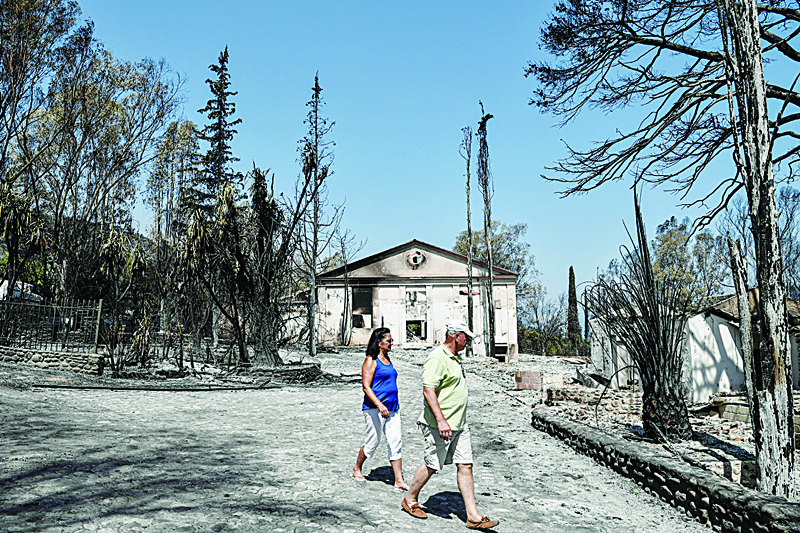LABIRI, Greece: Firefighters were battling two large wildfires in Greece yesterday as the prime minister said the country was suffering its worst heatwave in more than three decades. Fires have also raged across Turkey, Spain and Italy over the weekend with experts warning climate change was increasing both the frequency and intensity of such blazes.
More than 3,000 hectares (7,400 acres) of pine and olive groves have been torched by a fire that broke out on Saturday near the city of Patras, 200 kilometers (125 miles) west of Athens, according to the National Observatory of Athens citing EU satellite images. And the authorities were rushing to bolster crews fighting a blaze on the island of Rhodes near Turkey.
"We are facing the worst heatwave since 1987," Prime Minister Kyriakos Mitsotakis said, adding that the authorities were doing "everything possible" to deal with the situation. After meeting electricity providers, he warned that the brutal heat was putting a strain on the power network and asked for Greeks to limit their consumption in the early afternoon and during the night. Deputy Civil Protection Minister Nikos Hardalias said that there had been 1,584 fires across Greece in July compared to 953 in 2019, and that there had been 116 new blazes in just the last 24 hours.
"We are no longer talking about climate change but about a climate threat," he told Star TV. The fire near Patras was not fully under control yesterday, the country's weather service told the ANA news agency. And temperatures of up to 45 degrees Celsius (113 degrees Fahrenheit) have been forecast for nearby areas, posing new risks for land already parched by the heatwave. Officials have evacuated five villages and a seaside town and eight people have been hospitalized with burns and respiratory problems.
Help sent to Rhodes
However, officials were optimistic that a fire on the island of Rhodes, near the Turkish coast, was on the back foot after more firefighters and resources were deployed overnight. "Dawn finds Rhodes much better than the day before," South Aegean Governor George Hatzimarkos said in a statement.
He added that the fronts of the fire were receding and "almost under control". More than 100 firefighters, helped by 20 vehicles, three planes and six helicopters, were sent to Rhodes yesterday morning, officials said. Dozens more firefighters and 14 vehicles were due to arrive from Athens later in the day.
Firefighters evacuated a central area on the island known as "the Valley of the Butterflies" popular with hikers and tourists on Sunday. Temperatures of between 40 and 42 degrees Celsius have been forecast for the island in the coming days, with the heatwave expected to peak today. Nearby Turkey is suffering its worst fires in at least a decade, claiming the lives of eight people and forcing hundreds to evacuate in southern areas popular with tourists.
Meanwhile, the European Union sent help to Turkey yesterday and volunteers joined firefighters in battling a week of violent blazes that have killed eight people and put pressure on President Recep Tayyip Erdogan. The wildfires tearing through the resort regions of Turkey's Mediterranean and Aegean coasts have destroyed huge swathes of pristine forest and forced the evacuation of panicked tourists from their hotels.
But they have also exposed Erdogan-facing an election in two years that could extend his rule into a third decade-to a new round of criticism over his seemingly sluggish and out-of-touch response. The Turkish leader came under especially strong criticism over the weekend for tossing bags of tea to locals while touring one of the most badly-affected regions under heavy police escort.
The government has also disclosed that it had no firefighting planes in its inventory and had to rely on foreign help to battle the flames.
Foreign Minister Mevlut Cavusoglu thanked Brussels on Monday for sending a plane from Croatia and two from Spain. The European Union said it "stands in full solidarity with Turkey at this very difficult time"-a message designed to show goodwill after more than a year of heated disputes. Fanned by soaring temperatures and strong winds-with experts saying that climate change increases both the frequency and intensity of such blazes-EU data show this year's fire season has been significantly more destructive than most. - AFP



